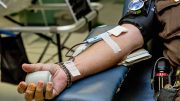A new study by the U.S. Centers for Disease Contorl finds that both the number of HIV tests administered and the number of new HIV diagnoses were substantially higher in the week around the 2010 National HIV Testing Day (NHTD) than in two other “control” weeks during that year. For the study, CDC researchers analyzed HIV testing data collected through the 2010 National HIV Prevention Program Monitoring and Evaluation System. They compared testing data for the number of HIV testing events and new HIV-positive diagnoses for the week of NHTD (June 24-30) with two control weeks (January 7-13 and August 12-18). The comparison revealed that an average of 15,000 more testing events were conducted and 100 more new HIV diagnoses were identified during NHTD week than during the control weeks.
In addition, compared to persons tested during the control weeks, a significantly higher proportion of those tested during NHTD week were: aged 50 years or older; non-Hispanic Blacks or African Americans; men who have sex with men; low-risk heterosexuals; tested with a rapid HIV test; or tested in a non-health-care setting.
“NHTD campaigns reached populations disproportionately affected by HIV and further expanded testing to people traditionally less likely to be tested,” the CDC researchers noted. “Incorporating strategies used during NHTD in programs conducted throughout the year may assist in increasing HIV testing and the number of HIV-positive diagnoses.”[pullquote] … a significantly higher proportion of those tested during NHTD week were: aged 50 years or older; non-Hispanic Blacks or African Americans; men who have sex with men; low-risk heterosexuals; tested with a rapid HIV test; or tested in a non-health-care setting.[/pullquote]
Toward that end, National Gay Men’s HIV/AIDS Awareness Day (NGMHAAD) was held last Saturday, September 27. The National Association of People with AIDS founded NGMHAAD “to help gay men remember how much we have accomplished together in the fight against HIV/AIDS, remember the quarter-million lovers and brothers we have lost, and renew our commitment to ending what is now an endable epidemic.”
The day is a good reminder to get tested for HIV. If you were not able to get tested this weekend, think about getting tested soon if you have not been recently tested for HIV. HIV testing is available on a walk-in basis at Fenway: Sixteen at 16 Haviland St., Boston Monday through Thursday from 9 a.m. to 6 p.m. and Friday from 9 a.m. to 5 p.m. (excluding holidays).
Information about how HIV impacts gay and bisexual men is below:
From the U.S. Centers for Disease Control and Prevention (CDC)
- HIV Among Gay and Bisexual Men. Also available in Spanish.
- HIV and Young Men Who Have Sex with Men
- HIV Surveillance in Men Who Have Sex with Men
- Syphilis & MSM
From the UCSF Center for AIDS Prevention Studies
- What Are Men Who Have Sex with Men (MSM)’s HIV Prevention Needs? Also available in Spanish.
- What Are the HIV Prevention Needs of Young Men Who Have Sex with Men? Also available in Spanish.
- How Do Sexual Networks Affect HIV/STD Prevention? Also available in Spanish.
FDA Approves New Once-Daily Tablet for HIV Treatment
Late last month, the U.S. Food and Drug Administration (FDA) approved Triumeq, a once-daily tablet that combines three previously approved HIV medications. Triumeq contains the integrase inhibitor dolutegravir (trade name Tivicay) and two nucleoside analog reverse transcriptase inhibitors―abacavir (Ziagen) and lamivudine (Epivir). Triumeq is the fourth approved once-a-day combination that comprises a complete HIV regimen in a single pill. The others are Atripla (approved in July 2006), Complera (approved in August 2011), and Stribild (approved in August 2012).
Of these four approved regimens-in-a-pill, Triumeq is the first that does not contain the drug tenofovir. Although tenofovir is generally a well-tolerated drug, some people experience tenofovir-related bone and kidney side effects, or have existing bone or kidney problems that may keep them from taking tenofovir or combination pills containing the drug. For such persons, Triumeq may be an alternative one-pill-a-day option for HIV treatment. However, before starting Triumeq, patients need to be screened for a genetic marker called HLA-B*5701. This marker helps identify the small percentage of people who can develop a severe drug reaction to abacavir―one of the component drugs in Triumeq. [pullquote]If you were not able to get tested this weekend, think about getting tested soon if you have not been recently tested for HIV. HIV testing is available on a walk-in basis at Fenway: Sixteen at 16 Haviland St., Boston Monday through Thursday from 9 a.m. to 6 p.m. and Friday from 9 a.m. to 5 p.m. (excluding holidays).[/pullquote]
A new Triumeq fact sheet from AIDSmeds.com has more detailed information about the treatment―including its dosing, drug interactions, side effects, contraindications (who shouldn’t take it), and the drug maker’s patient assistance program for persons who do not have private or public health insurance and are unable to afford Triumeq.
Blog Item: “How New York is Using Pre-Exposure Prophylaxis to End HIV”
This June, New York Governor Andrew Cuomo announced a plan to reduce new HIV infections in the state below epidemic levels by 2020. In the plan, pre-exposure prophylaxis (PrEP)―prescribing HIV medications to uninfected persons to prevent infections―is identified as one of three key strategies for reducing new infections. In this blog item, Dan O’Connell, Director of the New York State Department of Health’s AIDS Institute, outlines a six-step process for implementing PrEP statewide. “If PrEP works the way we believe it can, we will be on the fast track to meeting our objectives: few new infections, longer lives for those with HIV, bending the curve on AIDS,” O’Connell concludes. [pullquote]In recent years, there has been a growing body of evidence that transgender women have disproportionately high rates of HIV infection and substance use, as well as unemployment, poverty, violence, victimization, and discrimination.[/pullquote]
High Rates of Incarceration and Victimization Found Among Transgender Women in National Survey
In recent years, there has been a growing body of evidence that transgender women have disproportionately high rates of HIV infection and substance use, as well as unemployment, poverty, violence, victimization, and discrimination. The National Transgender Discrimination Survey (NTDS), conducted during 2008 through 2009, collected data on the life experiences of a large sample of transgender and gender-nonconforming adults from across the U.S. Researchers from The Fenway Institute and Harvard School of Public Health recently analyzed the NTDS data to determine the rates of incarceration and victimization while incarcerated among nearly 3,900 transgender women.
Overall, nearly one-fifth (19%) of the transgender women participants reported having ever been incarcerated. There were substantial racial and ethnic disparities in the incarceration rates for transgender women, with the highest rates among Blacks (56%) and Native American/Alaskan Natives (33%), and the lowest among non-Hispanic Whites (15%). In addition, transgender women with a history of incarceration were significantly more likely to have low income, have lower educational attainment, and to be publicly insured or uninsured than transgender women who had never been incarcerated.
Among the incarcerated transgender women, nearly half (47%) reported being mistreated or victimized while incarcerated. Black, Latina, and mixed-race transgender women were more than twice as likely to report experiences of mistreatment and victimization while incarcerated as White transgender women. The study researchers concluded that, “Interventions and policy changes are needed to support transgender women while incarcerated and upon release.”
New Briefing Paper on the Needs and Rights of Trans Sex Workers
“Trans sex workers (TSWs) are amongst the most marginalised and vulnerable sex workers due to widespread social stigmatisation attributable, in general, to transphobic prejudice in almost all countries,” according to a recent briefing paper from the Global Network of Sex Work Projects (NSWP), In Edinburgh, U.K. The 14-page briefing paper focuses on the issues and needs identified by TSWs in NSWP-sponsored focus groups and an online questionnaire. These include the criminalization of sex work, violence targeting TSWs, and pervasive discrimination that limits access to education and employment, housing, justice, and appropriate health care services. The paper includes a series of recommendations to guide policy-makers, program designers, funders, TSW allies, and the news media who wish to support TSW advocacy and activism efforts worldwide.
*Eric Brus is the Director of HIV Health Promotion of AIDS Action Committee. This report is produced by the Health Library of the AIDS Action Committee in collaboration with the New England AIDS Education and Training Center Minority AIDS Initiative Project. The full version is available online.








